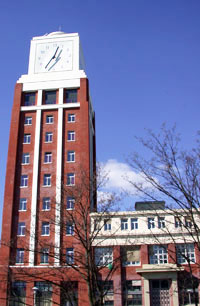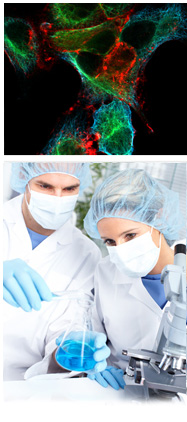Rheumatoid arthritis (RA) is a common disease which results in chronic inflammation of joint tissues, joint destruction and vascular damages.
RA is an auto-immune disease characterized by the production of auto-antibodies, including anti-CCP or ACPA. Genetic susceptibility and environnemental factors like smoking are known to favour its appearance. RA affects 0,3% of the population in France and about 50 million people in the world.
The treatment of RA combinate local ans systemic treatments. Methotrexate is the most commonly used drug. Over the past few years, new therapeutic targets have been discovered, leading to the development of new drugs specifically targeting a cytokine or a cell type. These targeted treatments are called « biotherapies » and are mainly monoclonal antibodies or receptors of cytokines. The most used of these drugs are the anti-TNFalpha and biotherapies targeting the Il-6 receptor, the interaction between lymphocyte and dendritic cell, B cells.
Due to its frequency, RA is a good model for the study of targeted treatments. Other inflammatory rheumatic diseases as well as other inflammatory diseases such as Crohn’s disease and psoriasis are also fields of application for strategies of biotherapies. We are developing several experimental of arthritis, and also models of psoriasis. We are also studying in parallel, in some cases, spondyloarthritides, rheumatic diseases that are almost as frequent as rheumatoid arthritis, and share some common mechanisms (such as a central role for TNF alpha) or specific pathways.
The identification of molecular and cellular players for a therapeutic use is a fundamental part of our research unit. Our team thus develops new therapeutic strategies and research of mechanisms of action of targeted therapies or biotherapy.
Genetic factors support only a part of pathophysiology of Rheumatoid Arthritis. Environmental factors are major players in this disease. The best studied factor is tobacco smoke. Smoking apparatus is a true risk factor for Rheumatoid Arthritis: its prevalence, severity, poor outcome, articular destruction, resistance to treatments.
We are studying pollution, and have started a collaboration with Sciences Po (Paris) on the role of silica in Rheumatoid Arthritis (part of the SILICOSIS project, funded by European Community as ERC). We are studying diet in Rheumatoid Arthritis, namely some lipids; for these projects, we collaborate with Serge Hercberg’s team at Bobigny (see Clinical Research of this file). We use also data from French ESPOIR cohort.
T cells are necessary for the initiation and development of rheumatoid arthritis. They are activated by antigen-presenting cells, among which dendritic cells are essential. Current data on lymphocyte differentiation suggest that regulatory T cells expressing the transcription factor FoxP3, a subpopulation of T cells, negatively regulate immune responses and may be essential players necessary for disease control. We are studying these regulatory cells and their role relative to other lymphocyte populations in rheumatoid arthritis patients and in experimental models. We are also investigating the links between these cells and rheumatoid arthritis biotherapies. In particular, we ask the question of whether they are involved in resistance to targeted therapies (anti-TNF, anti-IL-6R, JAK inhibitors...).
Polymorphonulear neutrophils are important for the development of inflammatory responses, as they are the first cells recruited at sites of inflammation. Activated neutrophils are particularly abundant in the joints of patients with RA. However, some neutrophil functions as well as mechanisms leading to neutrophil activation remain unknown. Moreover, new functions have been attributed to neutrophils, like the ability to act as antigen-presenting cells activating T cells. Similarly, neutrophils interact with dendritic cells, suggesting a link between innate and adaptive immunity as well as another way of immunoregulation, making neutrophils a promising therapeutic target.
For all those reasons, we are studying the mechanisms of neutrophil activation in RA and collagen-induced arthritis in mice and the consequences on the development of immune and inflammatory responses. We are analyzing in particular the role of Toll-like receptor (TLR) and endogenous ligands, the complement system and the cross-talk with other cells, like the proinflammatory Th17 cells. We are also studying netosis and some soluble mediators produced by neutrophils. The goal is to identify pathogenic mechanisms and new targets for future therapeutic approaches.
Collaborations for this theme: Prof. Marina Botto (London, England), Prof. Bernhard Singer (Essen, Germany), Prof. Guy Serre (Toulouse, France).
In RA, microvascular and macrovascular dysfunctions might result in microvascular and macrovascular diseases. Among microvascular dysfunctions, tissular angiogenesis is well known and among macrovascular dysfunctions, atheromatous diseases increases mortality risk in RA. Apart from the usual risk factors (hypercholesteronemia, hypertension, smoking, obesity), other risks could be expected in cardiovascular events including long term systemic inflammation, molecules produced by cells in the inflamed joints or treatments used such as corticoid, anti-inflammatory products or more recent biotherapies.
We assume that both joints and systemic inflammations might play an active role in extra articular events. Using experimental arthritis models, we study the endothelial dysfunctions which might be responsible for vascular dysfunctions in large vessels (aorta), in this inflammatory context. Our goal is to understand the link between arthritis development and vascular lesions formation to identify new targets for future therapeutic approaches..
This line of research concerns the design of new tools blocking the inflammation, the study of their action (experimental models) and their mode of action (in humans or in experimental models). Several categories of biotherapies are :
- Mode of action of biotherapies used in humans: anti-TNFalpha are the most used for RA. Their direct anti-inflammatory effect (the blocking of synovial TNFalpha can locally reduce inflammatory agents) guided their development. It appears now that the action of TNFalpha on immune system cells may explain the action of anti-TNFalpha on cell populations that regulate the immune response. We study the role of regulatory T cells, Th17 cells, Th1 and Th2 in the effectiveness of anti-TNFalpha or other biotherapies.
- Anti-cytokine vaccination: the study of molecular players involved in the inflammatory phenomena led us to develop strategies of specific inhibition. Classic anti-cytokine biotherapies are passive immunotherapies. We recently developed several strategies for active immunotherapy (or vaccination). We have demonstrated the concept of active immunotherapy in experimental models of arthritis and have collaborated for development several biotech companies such as Néovacs (Paris), Peptinov (Paris), Innavirvax (Evry). A clinical trial was very encourageing (pahse 2A), but we failed to demonstrate a mid-long term clinical effect in a larger phase 2B clinical trial (Néovacs promoter). At the present time, we have no current project focused on vaccination. One of the furure challenge will be to obtain high levels of neutralising antibodies after vaccination.
- We also use our know-how in experimental arthritides to collaborate, on focus projects, on novel therapeutic strategies in development with partners from academy or industry.
Within the rheumatology department of the Avicenne Hospital, clinical research is growing, in close contact with the laboratory.
- Nycthemeral variability in the detection of arthritis by ultrasound in RA
- Clinical trial (phase 2): active immunotherapy against TNF using TNF Kinoid (multicenter, international); promoter: Neovacs (Paris)
- Clinical trials and registries of registered biotherapies
- Metabolomic studies in rheumatoid arthritis (collaboration Inserm U967/CEA)
- Bone involvement in inflammatory diseases
- Omega-3 fatty acids an rheumatoid arthritis
- Impact of food intake and environmental factors in rheumatoid arthritis and spondyloarthropathies (collaboration with UREN, Inserm U557/CEA/CNAM); nutrinet study: www.etude-nutrinet-sante.fr



